2022年中考英语一轮复习第16讲:冀教版八年级下册Units 7-8课前基础过关检测(含答案)
文档属性
| 名称 | 2022年中考英语一轮复习第16讲:冀教版八年级下册Units 7-8课前基础过关检测(含答案) | 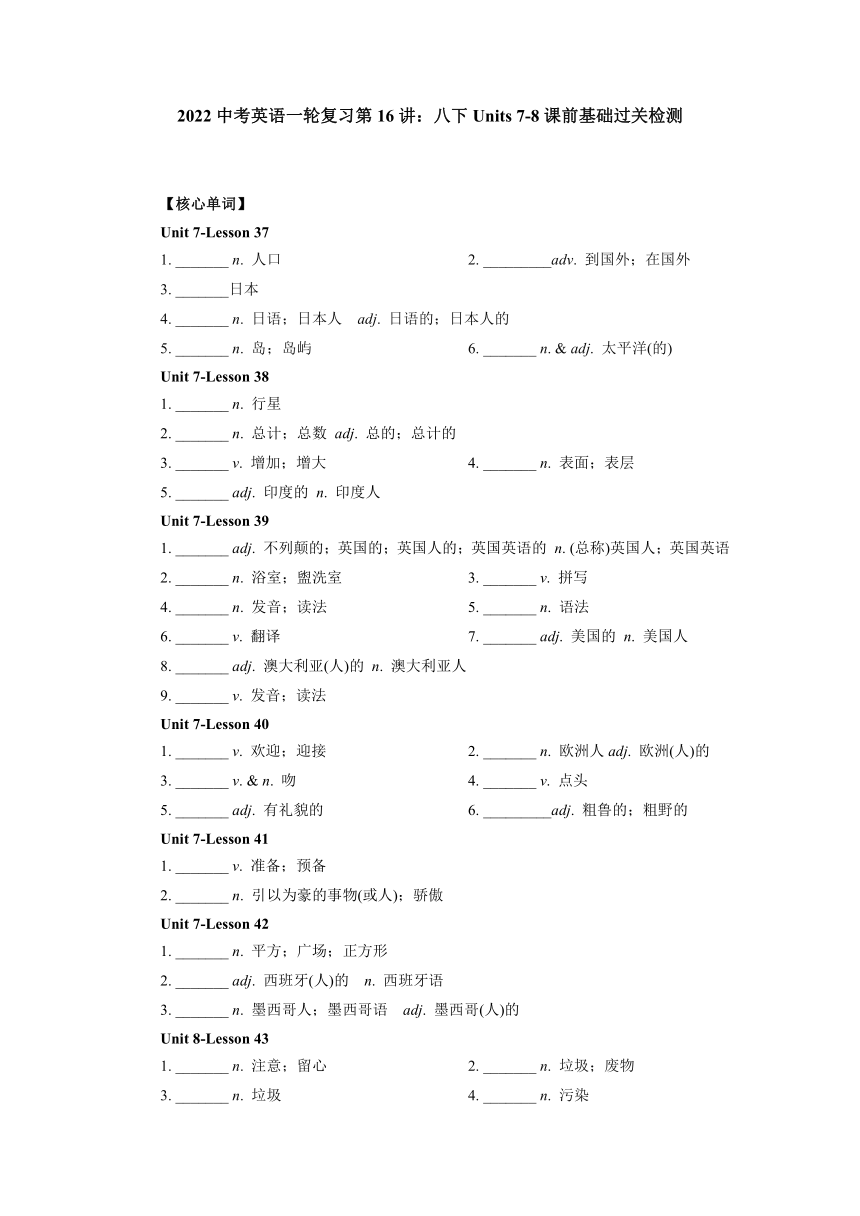 | |
| 格式 | doc | ||
| 文件大小 | 30.8KB | ||
| 资源类型 | 教案 | ||
| 版本资源 | 冀教版 | ||
| 科目 | 英语 | ||
| 更新时间 | 2022-03-13 22:39:53 | ||
图片预览

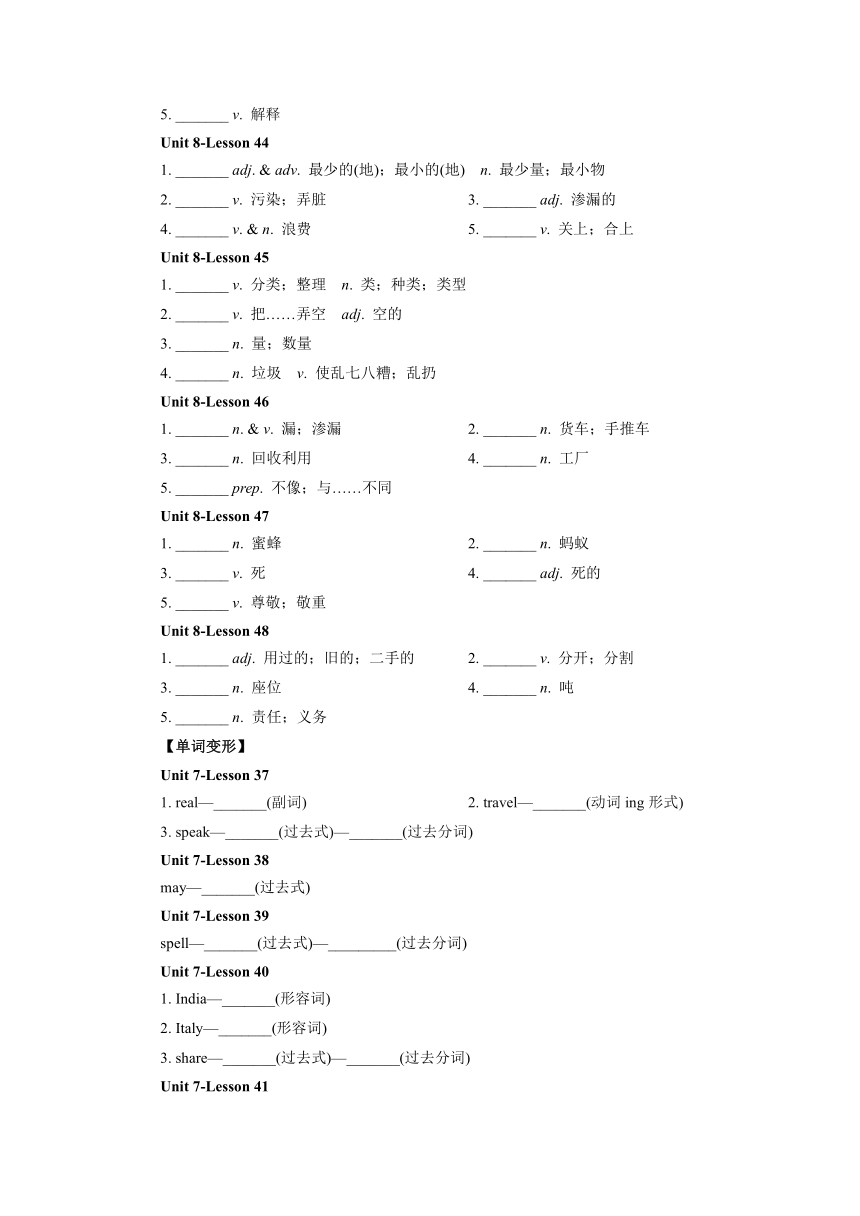
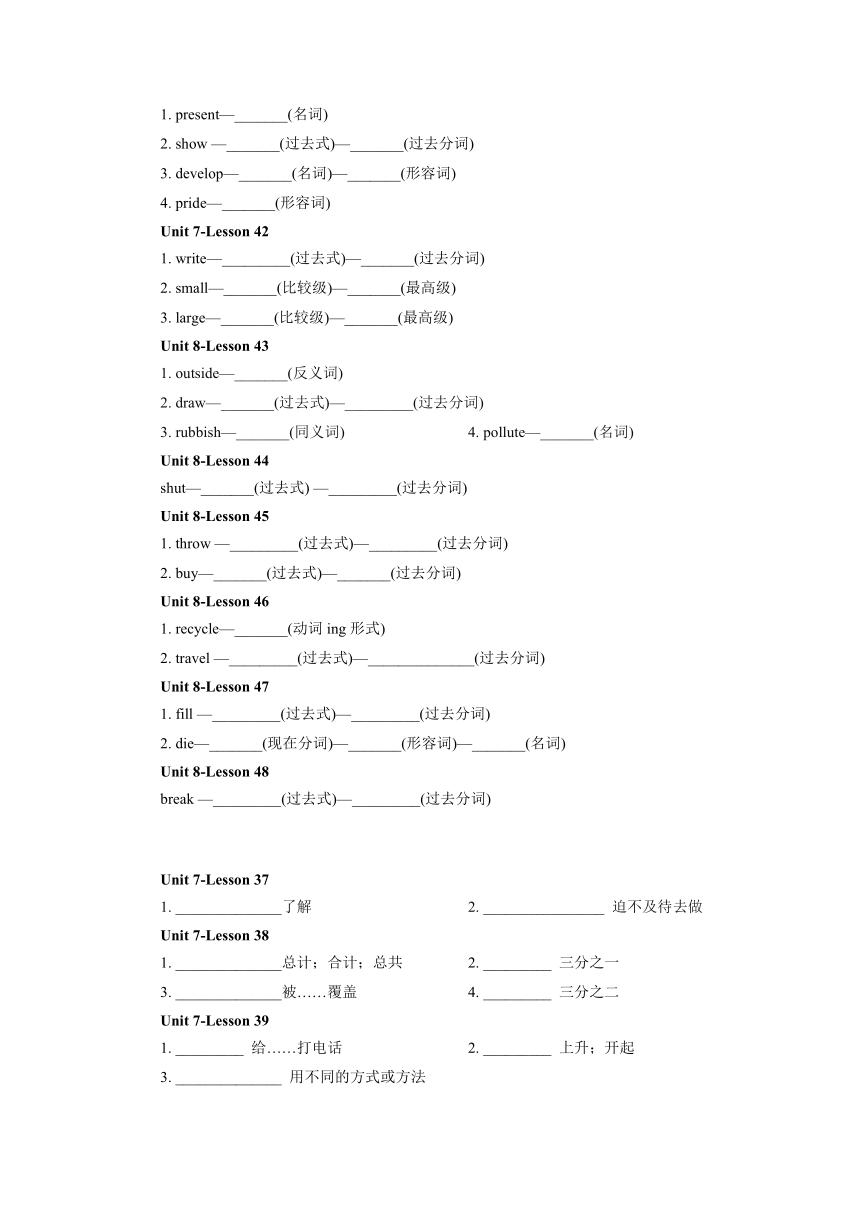
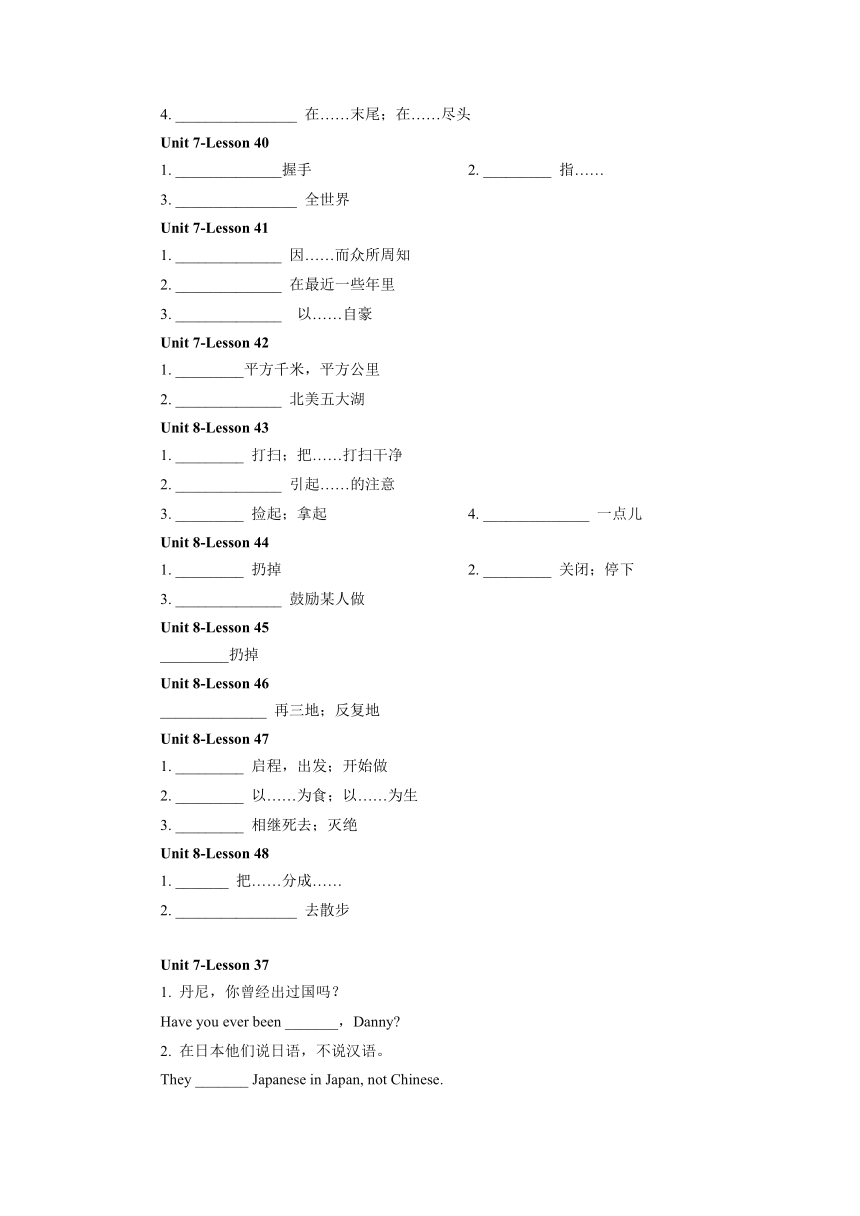
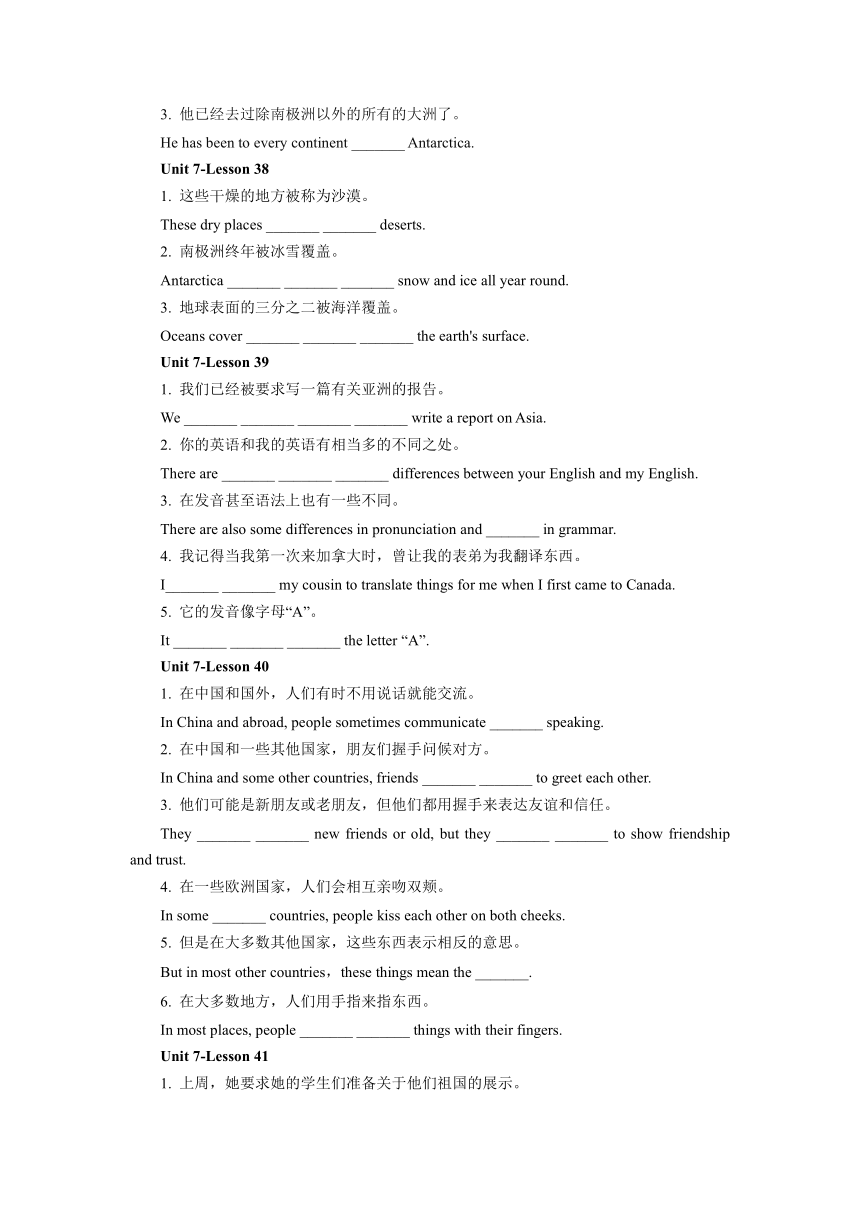
文档简介
2022中考英语一轮复习第16讲:八下Units 7-8课前基础过关检测
【核心单词】
Unit 7-Lesson 37
1. _______ n. 人口 2. _________adv. 到国外;在国外
3. _______日本
4. _______ n. 日语;日本人 adj. 日语的;日本人的
5. _______ n. 岛;岛屿 6. _______ n. & adj. 太平洋(的)
Unit 7-Lesson 38
1. _______ n. 行星
2. _______ n. 总计;总数 adj. 总的;总计的
3. _______ v. 增加;增大 4. _______ n. 表面;表层
5. _______ adj. 印度的 n. 印度人
Unit 7-Lesson 39
1. _______ adj. 不列颠的;英国的;英国人的;英国英语的 n. (总称)英国人;英国英语
2. _______ n. 浴室;盥洗室 3. _______ v. 拼写
4. _______ n. 发音;读法 5. _______ n. 语法
6. _______ v. 翻译 7. _______ adj. 美国的 n. 美国人
8. _______ adj. 澳大利亚(人)的 n. 澳大利亚人
9. _______ v. 发音;读法
Unit 7-Lesson 40
1. _______ v. 欢迎;迎接 2. _______ n. 欧洲人adj. 欧洲(人)的
3. _______ v. & n. 吻 4. _______ v. 点头
5. _______ adj. 有礼貌的 6. _________adj. 粗鲁的;粗野的
Unit 7-Lesson 41
1. _______ v. 准备;预备
2. _______ n. 引以为豪的事物(或人);骄傲
Unit 7-Lesson 42
1. _______ n. 平方;广场;正方形
2. _______ adj. 西班牙(人)的 n. 西班牙语
3. _______ n. 墨西哥人;墨西哥语 adj. 墨西哥(人)的
Unit 8-Lesson 43
1. _______ n. 注意;留心 2. _______ n. 垃圾;废物
3. _______ n. 垃圾 4. _______ n. 污染
5. _______ v. 解释
Unit 8-Lesson 44
1. _______ adj. & adv. 最少的(地);最小的(地) n. 最少量;最小物
2. _______ v. 污染;弄脏 3. _______ adj. 渗漏的
4. _______ v. & n. 浪费 5. _______ v. 关上;合上
Unit 8-Lesson 45
1. _______ v. 分类;整理 n. 类;种类;类型
2. _______ v. 把……弄空 adj. 空的
3. _______ n. 量;数量
4. _______ n. 垃圾 v. 使乱七八糟;乱扔
Unit 8-Lesson 46
1. _______ n. & v. 漏;渗漏 2. _______ n. 货车;手推车
3. _______ n. 回收利用 4. _______ n. 工厂
5. _______ prep. 不像;与……不同
Unit 8-Lesson 47
1. _______ n. 蜜蜂 2. _______ n. 蚂蚁
3. _______ v. 死 4. _______ adj. 死的
5. _______ v. 尊敬;敬重
Unit 8-Lesson 48
1. _______ adj. 用过的;旧的;二手的 2. _______ v. 分开;分割
3. _______ n. 座位 4. _______ n. 吨
5. _______ n. 责任;义务
【单词变形】
Unit 7-Lesson 37
1. real—_______(副词) 2. travel—_______(动词ing形式)
3. speak—_______(过去式)—_______(过去分词)
Unit 7-Lesson 38
may—_______(过去式)
Unit 7-Lesson 39
spell—_______(过去式)—_________(过去分词)
Unit 7-Lesson 40
1. India—_______(形容词)
2. Italy—_______(形容词)
3. share—_______(过去式)—_______(过去分词)
Unit 7-Lesson 41
1. present—_______(名词)
2. show —_______(过去式)—_______(过去分词)
3. develop—_______(名词)—_______(形容词)
4. pride—_______(形容词)
Unit 7-Lesson 42
1. write—_________(过去式)—_______(过去分词)
2. small—_______(比较级)—_______(最高级)
3. large—_______(比较级)—_______(最高级)
Unit 8-Lesson 43
1. outside—_______(反义词)
2. draw—_______(过去式)—_________(过去分词)
3. rubbish—_______(同义词) 4. pollute—_______(名词)
Unit 8-Lesson 44
shut—_______(过去式) —_________(过去分词)
Unit 8-Lesson 45
1. throw —_________(过去式)—_________(过去分词)
2. buy—_______(过去式)—_______(过去分词)
Unit 8-Lesson 46
1. recycle—_______(动词ing形式)
2. travel —_________(过去式)—______________(过去分词)
Unit 8-Lesson 47
1. fill —_________(过去式)—_________(过去分词)
2. die—_______(现在分词)—_______(形容词)—_______(名词)
Unit 8-Lesson 48
break —_________(过去式)—_________(过去分词)
Unit 7-Lesson 37
1. ______________了解 2. ________________ 迫不及待去做
Unit 7-Lesson 38
1. ______________总计;合计;总共 2. _________ 三分之一
3. ______________被……覆盖 4. _________ 三分之二
Unit 7-Lesson 39
1. _________ 给……打电话 2. _________ 上升;开起
3. ______________ 用不同的方式或方法
4. ________________ 在……末尾;在……尽头
Unit 7-Lesson 40
1. ______________握手 2. _________ 指……
3. ________________ 全世界
Unit 7-Lesson 41
1. ______________ 因……而众所周知
2. ______________ 在最近一些年里
3. ______________ 以……自豪
Unit 7-Lesson 42
1. _________平方千米,平方公里
2. ______________ 北美五大湖
Unit 8-Lesson 43
1. _________ 打扫;把……打扫干净
2. ______________ 引起……的注意
3. _________ 捡起;拿起 4. ______________ 一点儿
Unit 8-Lesson 44
1. _________ 扔掉 2. _________ 关闭;停下
3. ______________ 鼓励某人做
Unit 8-Lesson 45
_________扔掉
Unit 8-Lesson 46
______________ 再三地;反复地
Unit 8-Lesson 47
1. _________ 启程,出发;开始做
2. _________ 以……为食;以……为生
3. _________ 相继死去;灭绝
Unit 8-Lesson 48
1. _______ 把……分成……
2. ________________ 去散步
Unit 7-Lesson 37
1. 丹尼,你曾经出过国吗?
Have you ever been _______,Danny
2. 在日本他们说日语,不说汉语。
They _______ Japanese in Japan, not Chinese.
3. 他已经去过除南极洲以外的所有的大洲了。
He has been to every continent _______ Antarctica.
Unit 7-Lesson 38
1. 这些干燥的地方被称为沙漠。
These dry places _______ _______ deserts.
2. 南极洲终年被冰雪覆盖。
Antarctica _______ _______ _______ snow and ice all year round.
3. 地球表面的三分之二被海洋覆盖。
Oceans cover _______ _______ _______ the earth's surface.
Unit 7-Lesson 39
1. 我们已经被要求写一篇有关亚洲的报告。
We _______ _______ _______ _______ write a report on Asia.
2. 你的英语和我的英语有相当多的不同之处。
There are _______ _______ _______ differences between your English and my English.
3. 在发音甚至语法上也有一些不同。
There are also some differences in pronunciation and _______ in grammar.
4. 我记得当我第一次来加拿大时,曾让我的表弟为我翻译东西。
I_______ _______ my cousin to translate things for me when I first came to Canada.
5. 它的发音像字母“A”。
It _______ _______ _______ the letter “A”.
Unit 7-Lesson 40
1. 在中国和国外,人们有时不用说话就能交流。
In China and abroad, people sometimes communicate _______ speaking.
2. 在中国和一些其他国家,朋友们握手问候对方。
In China and some other countries, friends _______ _______ to greet each other.
3. 他们可能是新朋友或老朋友,但他们都用握手来表达友谊和信任。
They _______ _______ new friends or old, but they _______ _______ to show friendship and trust.
4. 在一些欧洲国家,人们会相互亲吻双颊。
In some _______ countries, people kiss each other on both cheeks.
5. 但是在大多数其他国家,这些东西表示相反的意思。
But in most other countries,these things mean the _______.
6. 在大多数地方,人们用手指来指东西。
In most places, people _______ _______ things with their fingers.
Unit 7-Lesson 41
1. 上周,她要求她的学生们准备关于他们祖国的展示。
Last week, she asked her students to _______ presentations about their home countries.
2. 它拥有一条被称作亚马逊河的很大的河流和一片你想象不到的树木众多的热带雨林。
It has a huge river _______ the Amazon and a rainforest with more trees than you can imagine.
3. 我们那里的人们因有趣的舞蹈和丰富多彩的文化而闻名。
My people _______ _______ _______ our fun dances and colourful culture.
4. 所有的一切综合起来使它成为一个有待发现的伟大的地方。
Everything comes together to _______ _______ a great place to discover.
5. 更多的学生自豪地来到前面谈论他们的国家。
More students come to the front to talk about their countries _______ _______.
Unit 7-Lesson 42
1. 加拿大的南面是美国。
_______ the south of Canada is the United States.
2. 那是很多的人口,但比中国的人口少。
That is a large population, but smaller than _______ _______ China.
3. ……但第三种最常见的语言是汉语!
. . . but _______ _______ _______ common language is Chinese!
4. 美国也是一个很大的国家,而且它的人口数目比北美洲其他任何国家都大得多。
The U. S. is also a very large country, and its population is _______ _______ _______ _______ _______ _______ in North America.
5. ……但是有许多人离开到美国去生活、工作。
. . . but many _______ _______ live and work in the U. S.
Unit 8-Lesson 43
1. 它是一个引起人们注意环境的日子。
It's a special day to _______ _______ _______ to the environment.
2. 我们应该把垃圾捡起来!
We should _______ _______ the garbage!
3. 每个学生能清扫校园的一块地方。
Each student could _______ _______ _______ _______ _______ the schoolyard.
Unit 8-Lesson 44
1. 环境俱乐部鼓励学生们用可重复使用的袋子和餐具带午饭。
Environment clubs _______ _______ to bring their lunches in reusable bags and dishes.
2. 当你离开房间的时候关掉灯。
_______ _______ the lights when you leave a room.
Unit 8-Lesson 45
1. 你怎样处理垃圾?
What do you _______ _______ your garbage
2. 丹尼把两袋子垃圾倒在地上了。
Danny _______ two bags of garbage onto the floor.
3. 我能帮你把它分类吗?
Can I help you _______ it
4. 将垃圾分好类后,丹尼和珍妮都很惊讶。
After they _______ the garbage, Danny and Jenny are surprised.
5. 几乎所有的(垃圾)都可以被再利用或循环利用!
_______ all of it can be reused or recycled!
6. 纸比塑料多。
There is _______ paper _______ plastic.
7. 垃圾能伤到人!
_______ can hurt people!
8. 通过这个程序很容易找到信息。
It is quite easy to find _______ with this program.
Unit 8-Lesson 46
1. 你的家乡够干净吗?
Is your hometown _______ _______?
2. 我洗短时淋浴。
I _______ short _______.
3. 我经常检查确保没有渗漏……
I often check to _______ _______ there aren't any leaks. . .
4. 它被制成新的东西。
It _______ _______ _______ new things.
5. 自行车不像其他类型的交通工具,它不制造任何污染。
_______ other types of transportation,a bike doesn't make any pollution.
6. 事实上,如果我们每个人在生活中改变一点点,我们可以对环境产生很大影响。
_______ _______, if each of us makes a small change in our life, we can _______ _______ _______ _______ to our environment.
7. 保护环境并不难。
It's not too hard _______ protect the environment.
Unit 8-Lesson 47
1. 地球上的所有生物都是互相依存吗?
Do all the living things on the planet _______ _______ one another
2. 自然界充满着生物。
The natural world is _______ _______ living things.
3. 生物刚开始是弱小的……
Living things _______ _______ weak. . .
4. 我们在一些方面是不一样的,但是所有的生物都是相关的。
We are different in some ways, but all living things _______ _______.
5. 一些鸟以鱼为食。
Some birds _______ _______ fish.
6. 如果鸟吃了生病的或死了的鱼,它们可能相继死去。
If the birds eat the sick or dead fish,they may _______ _______.
Unit 8-Lesson 48
1. 我们所有的同班同学都帮忙了。
_______ _______ our classmates helped.
2. 看到大家在一起努力真棒!
_______ was great to see everyone working together!
3. 丹尼发现了一个坏了一个轮子的二手玩具汽车。
Danny found a _______ toy car with one broken wheel.
4. 我们戴上手套把垃圾分成不同的小堆:玻璃、金属、塑料、纸和所有其他东西。
We put on gloves and _______ the garbage _______ different piles: glass, metal, plastic,paper and everything else.
5. 我认为保护环境是我们的责任。
I think _______ _______ _______ to protect the environment.
6. 这个月晚些时候,我们将会到城市回收中心进行一次班级旅行。
Later this month, we will _______ _______ a class trip to the city recycling centre.
参考答案
核心词汇
Unit 7-Lesson 37
1. population 2. abroad 3. Japan
4. Japanese 5. island 6. Pacific
Unit 7-Lesson 38
1. planet 2. total 3. increase 4. surface 5. Indian
Unit 7-Lesson 39
1. British 2. bathroom 3. spell
4. pronunciation 5. grammar 6. translate
7. American 8. Australian 9. pronounce
Unit 7-Lesson 40
1. greet 2. European 3. kiss 4. nod 5. polite 6. rude
Unit 7-Lesson 41
1. prepare 2. pride
Unit 7-Lesson 42
1. square 2. Spanish 3. Mexican
Unit 8-Lesson 43
1. attention 2. rubbish 3. garbage
4. pollution 5. explain
Unit 8-Lesson 44
1. least 2. pollute 3. leaky 4. waste 5. shut
Unit 8-Lesson 45
1. sort 2. empty 3. amount 4. litter
Unit 8-Lesson 46
1. leak 2. truck 3. recycling 4. factory
5. unlike
Unit 8-Lesson 47
1. bee 2. ant 3. die 4. dead
5. respect
Unit 8-Lesson 48
1. used 2. divide 3. seat 4. ton 5. duty
词汇变形
Unit 7-Lesson 37
1. really 2. travel(l)ing 3. spoke spoken
Unit 7-Lesson 38
might
Unit 7-Lesson 39
spelled/spelt spelled/spelt
Unit 7-Lesson 40
1. Indian 2. Italian 3. shared shared
Unit 7-Lesson 41
1. presentation 2. showed showed
3. development developing/developed
4. proud
Unit 7-Lesson 42
1. wrote written 2. smaller smallest 3. larger largest
Unit 8-Lesson 43
1. inside 2. drew drawn
3. garbage 4. pollution
Unit 8-Lesson 44
shut shut
Unit 8-Lesson 45
1. threw thrown 2. bought bought
Unit 8-Lesson 46
1. recycling 2. travel(l)ed travel(l)ed
Unit 8-Lesson 47
1. filled filled 2. dying dead death
Unit 8-Lesson 48
broke broken
过短语
Unit 7-Lesson 37
1. learn about 2. can't wait to do
Unit 7-Lesson 38
1. in total 2. one third
3. be covered with. . . 4. two thirds
Unit 7-Lesson 39
1. ring up 2. go up 3. in different ways
4. at the end of
Unit 7-Lesson 40
1. shake hands 2. point to
3. all around the world
Unit 7-Lesson 41
1. be known for. . .
2. in recent years
3. be proud of
Unit 7-Lesson 42
1. square kilometer 2. The Great Lakes
Unit 8-Lesson 43
1. clean up 2. draw one's attention
3. pick up 4. a bit of
Unit 8-Lesson 44
1. throw away 2. shut down
3. encourage sb. to do
Unit 8-Lesson 45
throw away
Unit 8-Lesson 46
again and again
Unit 8-Lesson 47
1. start out 2. live off 3. die off
Unit 8-Lesson 48
1. divide. . . into. . . 2. go for a walk
过句子
Unit 7-Lesson 37
1. abroad 2. speak 3. except
Unit 7-Lesson 38
1. are called 2. is covered with
3. two thirds of
Unit 7-Lesson 39
1. have been asked to 2. quite a few
3. even 4. remember asking 5. is pronounced like
Unit 7-Lesson 40
1. without 2. shake hands 3. may be shake hands 4. European 5. opposite 6. point to
Unit 7-Lesson 41
1. prepare 2. called 3. are known for 4. make it 5. with pride
Unit 7-Lesson 42
1. To 2. that of 3. the third most
4. much larger than any other country 5. leave to
Unit 8-Lesson 43
1. draw people's attention 2. pick up
3. clean up a bit of
Unit 8-Lesson 44
1. encourage students 2. Turn off
Unit 8-Lesson 45
1. do with 2. empties 3. sort
4. sort 5. Almost 6. more than
7. Litter 8. information
Unit 8-Lesson 46
1. clean enough 2. take showers
3. make sure 4. is made into 5. Unlike
6. In fact make a big difference 7. to
Unit 8-Lesson 47
1. depend on 2. filled with 3. start out 4. are connected 5. live off 6. die off
Unit 8-Lesson 48
1. All of 2. It 3. used 4. divided into
5. it's our duty 6. go on
【核心单词】
Unit 7-Lesson 37
1. _______ n. 人口 2. _________adv. 到国外;在国外
3. _______日本
4. _______ n. 日语;日本人 adj. 日语的;日本人的
5. _______ n. 岛;岛屿 6. _______ n. & adj. 太平洋(的)
Unit 7-Lesson 38
1. _______ n. 行星
2. _______ n. 总计;总数 adj. 总的;总计的
3. _______ v. 增加;增大 4. _______ n. 表面;表层
5. _______ adj. 印度的 n. 印度人
Unit 7-Lesson 39
1. _______ adj. 不列颠的;英国的;英国人的;英国英语的 n. (总称)英国人;英国英语
2. _______ n. 浴室;盥洗室 3. _______ v. 拼写
4. _______ n. 发音;读法 5. _______ n. 语法
6. _______ v. 翻译 7. _______ adj. 美国的 n. 美国人
8. _______ adj. 澳大利亚(人)的 n. 澳大利亚人
9. _______ v. 发音;读法
Unit 7-Lesson 40
1. _______ v. 欢迎;迎接 2. _______ n. 欧洲人adj. 欧洲(人)的
3. _______ v. & n. 吻 4. _______ v. 点头
5. _______ adj. 有礼貌的 6. _________adj. 粗鲁的;粗野的
Unit 7-Lesson 41
1. _______ v. 准备;预备
2. _______ n. 引以为豪的事物(或人);骄傲
Unit 7-Lesson 42
1. _______ n. 平方;广场;正方形
2. _______ adj. 西班牙(人)的 n. 西班牙语
3. _______ n. 墨西哥人;墨西哥语 adj. 墨西哥(人)的
Unit 8-Lesson 43
1. _______ n. 注意;留心 2. _______ n. 垃圾;废物
3. _______ n. 垃圾 4. _______ n. 污染
5. _______ v. 解释
Unit 8-Lesson 44
1. _______ adj. & adv. 最少的(地);最小的(地) n. 最少量;最小物
2. _______ v. 污染;弄脏 3. _______ adj. 渗漏的
4. _______ v. & n. 浪费 5. _______ v. 关上;合上
Unit 8-Lesson 45
1. _______ v. 分类;整理 n. 类;种类;类型
2. _______ v. 把……弄空 adj. 空的
3. _______ n. 量;数量
4. _______ n. 垃圾 v. 使乱七八糟;乱扔
Unit 8-Lesson 46
1. _______ n. & v. 漏;渗漏 2. _______ n. 货车;手推车
3. _______ n. 回收利用 4. _______ n. 工厂
5. _______ prep. 不像;与……不同
Unit 8-Lesson 47
1. _______ n. 蜜蜂 2. _______ n. 蚂蚁
3. _______ v. 死 4. _______ adj. 死的
5. _______ v. 尊敬;敬重
Unit 8-Lesson 48
1. _______ adj. 用过的;旧的;二手的 2. _______ v. 分开;分割
3. _______ n. 座位 4. _______ n. 吨
5. _______ n. 责任;义务
【单词变形】
Unit 7-Lesson 37
1. real—_______(副词) 2. travel—_______(动词ing形式)
3. speak—_______(过去式)—_______(过去分词)
Unit 7-Lesson 38
may—_______(过去式)
Unit 7-Lesson 39
spell—_______(过去式)—_________(过去分词)
Unit 7-Lesson 40
1. India—_______(形容词)
2. Italy—_______(形容词)
3. share—_______(过去式)—_______(过去分词)
Unit 7-Lesson 41
1. present—_______(名词)
2. show —_______(过去式)—_______(过去分词)
3. develop—_______(名词)—_______(形容词)
4. pride—_______(形容词)
Unit 7-Lesson 42
1. write—_________(过去式)—_______(过去分词)
2. small—_______(比较级)—_______(最高级)
3. large—_______(比较级)—_______(最高级)
Unit 8-Lesson 43
1. outside—_______(反义词)
2. draw—_______(过去式)—_________(过去分词)
3. rubbish—_______(同义词) 4. pollute—_______(名词)
Unit 8-Lesson 44
shut—_______(过去式) —_________(过去分词)
Unit 8-Lesson 45
1. throw —_________(过去式)—_________(过去分词)
2. buy—_______(过去式)—_______(过去分词)
Unit 8-Lesson 46
1. recycle—_______(动词ing形式)
2. travel —_________(过去式)—______________(过去分词)
Unit 8-Lesson 47
1. fill —_________(过去式)—_________(过去分词)
2. die—_______(现在分词)—_______(形容词)—_______(名词)
Unit 8-Lesson 48
break —_________(过去式)—_________(过去分词)
Unit 7-Lesson 37
1. ______________了解 2. ________________ 迫不及待去做
Unit 7-Lesson 38
1. ______________总计;合计;总共 2. _________ 三分之一
3. ______________被……覆盖 4. _________ 三分之二
Unit 7-Lesson 39
1. _________ 给……打电话 2. _________ 上升;开起
3. ______________ 用不同的方式或方法
4. ________________ 在……末尾;在……尽头
Unit 7-Lesson 40
1. ______________握手 2. _________ 指……
3. ________________ 全世界
Unit 7-Lesson 41
1. ______________ 因……而众所周知
2. ______________ 在最近一些年里
3. ______________ 以……自豪
Unit 7-Lesson 42
1. _________平方千米,平方公里
2. ______________ 北美五大湖
Unit 8-Lesson 43
1. _________ 打扫;把……打扫干净
2. ______________ 引起……的注意
3. _________ 捡起;拿起 4. ______________ 一点儿
Unit 8-Lesson 44
1. _________ 扔掉 2. _________ 关闭;停下
3. ______________ 鼓励某人做
Unit 8-Lesson 45
_________扔掉
Unit 8-Lesson 46
______________ 再三地;反复地
Unit 8-Lesson 47
1. _________ 启程,出发;开始做
2. _________ 以……为食;以……为生
3. _________ 相继死去;灭绝
Unit 8-Lesson 48
1. _______ 把……分成……
2. ________________ 去散步
Unit 7-Lesson 37
1. 丹尼,你曾经出过国吗?
Have you ever been _______,Danny
2. 在日本他们说日语,不说汉语。
They _______ Japanese in Japan, not Chinese.
3. 他已经去过除南极洲以外的所有的大洲了。
He has been to every continent _______ Antarctica.
Unit 7-Lesson 38
1. 这些干燥的地方被称为沙漠。
These dry places _______ _______ deserts.
2. 南极洲终年被冰雪覆盖。
Antarctica _______ _______ _______ snow and ice all year round.
3. 地球表面的三分之二被海洋覆盖。
Oceans cover _______ _______ _______ the earth's surface.
Unit 7-Lesson 39
1. 我们已经被要求写一篇有关亚洲的报告。
We _______ _______ _______ _______ write a report on Asia.
2. 你的英语和我的英语有相当多的不同之处。
There are _______ _______ _______ differences between your English and my English.
3. 在发音甚至语法上也有一些不同。
There are also some differences in pronunciation and _______ in grammar.
4. 我记得当我第一次来加拿大时,曾让我的表弟为我翻译东西。
I_______ _______ my cousin to translate things for me when I first came to Canada.
5. 它的发音像字母“A”。
It _______ _______ _______ the letter “A”.
Unit 7-Lesson 40
1. 在中国和国外,人们有时不用说话就能交流。
In China and abroad, people sometimes communicate _______ speaking.
2. 在中国和一些其他国家,朋友们握手问候对方。
In China and some other countries, friends _______ _______ to greet each other.
3. 他们可能是新朋友或老朋友,但他们都用握手来表达友谊和信任。
They _______ _______ new friends or old, but they _______ _______ to show friendship and trust.
4. 在一些欧洲国家,人们会相互亲吻双颊。
In some _______ countries, people kiss each other on both cheeks.
5. 但是在大多数其他国家,这些东西表示相反的意思。
But in most other countries,these things mean the _______.
6. 在大多数地方,人们用手指来指东西。
In most places, people _______ _______ things with their fingers.
Unit 7-Lesson 41
1. 上周,她要求她的学生们准备关于他们祖国的展示。
Last week, she asked her students to _______ presentations about their home countries.
2. 它拥有一条被称作亚马逊河的很大的河流和一片你想象不到的树木众多的热带雨林。
It has a huge river _______ the Amazon and a rainforest with more trees than you can imagine.
3. 我们那里的人们因有趣的舞蹈和丰富多彩的文化而闻名。
My people _______ _______ _______ our fun dances and colourful culture.
4. 所有的一切综合起来使它成为一个有待发现的伟大的地方。
Everything comes together to _______ _______ a great place to discover.
5. 更多的学生自豪地来到前面谈论他们的国家。
More students come to the front to talk about their countries _______ _______.
Unit 7-Lesson 42
1. 加拿大的南面是美国。
_______ the south of Canada is the United States.
2. 那是很多的人口,但比中国的人口少。
That is a large population, but smaller than _______ _______ China.
3. ……但第三种最常见的语言是汉语!
. . . but _______ _______ _______ common language is Chinese!
4. 美国也是一个很大的国家,而且它的人口数目比北美洲其他任何国家都大得多。
The U. S. is also a very large country, and its population is _______ _______ _______ _______ _______ _______ in North America.
5. ……但是有许多人离开到美国去生活、工作。
. . . but many _______ _______ live and work in the U. S.
Unit 8-Lesson 43
1. 它是一个引起人们注意环境的日子。
It's a special day to _______ _______ _______ to the environment.
2. 我们应该把垃圾捡起来!
We should _______ _______ the garbage!
3. 每个学生能清扫校园的一块地方。
Each student could _______ _______ _______ _______ _______ the schoolyard.
Unit 8-Lesson 44
1. 环境俱乐部鼓励学生们用可重复使用的袋子和餐具带午饭。
Environment clubs _______ _______ to bring their lunches in reusable bags and dishes.
2. 当你离开房间的时候关掉灯。
_______ _______ the lights when you leave a room.
Unit 8-Lesson 45
1. 你怎样处理垃圾?
What do you _______ _______ your garbage
2. 丹尼把两袋子垃圾倒在地上了。
Danny _______ two bags of garbage onto the floor.
3. 我能帮你把它分类吗?
Can I help you _______ it
4. 将垃圾分好类后,丹尼和珍妮都很惊讶。
After they _______ the garbage, Danny and Jenny are surprised.
5. 几乎所有的(垃圾)都可以被再利用或循环利用!
_______ all of it can be reused or recycled!
6. 纸比塑料多。
There is _______ paper _______ plastic.
7. 垃圾能伤到人!
_______ can hurt people!
8. 通过这个程序很容易找到信息。
It is quite easy to find _______ with this program.
Unit 8-Lesson 46
1. 你的家乡够干净吗?
Is your hometown _______ _______?
2. 我洗短时淋浴。
I _______ short _______.
3. 我经常检查确保没有渗漏……
I often check to _______ _______ there aren't any leaks. . .
4. 它被制成新的东西。
It _______ _______ _______ new things.
5. 自行车不像其他类型的交通工具,它不制造任何污染。
_______ other types of transportation,a bike doesn't make any pollution.
6. 事实上,如果我们每个人在生活中改变一点点,我们可以对环境产生很大影响。
_______ _______, if each of us makes a small change in our life, we can _______ _______ _______ _______ to our environment.
7. 保护环境并不难。
It's not too hard _______ protect the environment.
Unit 8-Lesson 47
1. 地球上的所有生物都是互相依存吗?
Do all the living things on the planet _______ _______ one another
2. 自然界充满着生物。
The natural world is _______ _______ living things.
3. 生物刚开始是弱小的……
Living things _______ _______ weak. . .
4. 我们在一些方面是不一样的,但是所有的生物都是相关的。
We are different in some ways, but all living things _______ _______.
5. 一些鸟以鱼为食。
Some birds _______ _______ fish.
6. 如果鸟吃了生病的或死了的鱼,它们可能相继死去。
If the birds eat the sick or dead fish,they may _______ _______.
Unit 8-Lesson 48
1. 我们所有的同班同学都帮忙了。
_______ _______ our classmates helped.
2. 看到大家在一起努力真棒!
_______ was great to see everyone working together!
3. 丹尼发现了一个坏了一个轮子的二手玩具汽车。
Danny found a _______ toy car with one broken wheel.
4. 我们戴上手套把垃圾分成不同的小堆:玻璃、金属、塑料、纸和所有其他东西。
We put on gloves and _______ the garbage _______ different piles: glass, metal, plastic,paper and everything else.
5. 我认为保护环境是我们的责任。
I think _______ _______ _______ to protect the environment.
6. 这个月晚些时候,我们将会到城市回收中心进行一次班级旅行。
Later this month, we will _______ _______ a class trip to the city recycling centre.
参考答案
核心词汇
Unit 7-Lesson 37
1. population 2. abroad 3. Japan
4. Japanese 5. island 6. Pacific
Unit 7-Lesson 38
1. planet 2. total 3. increase 4. surface 5. Indian
Unit 7-Lesson 39
1. British 2. bathroom 3. spell
4. pronunciation 5. grammar 6. translate
7. American 8. Australian 9. pronounce
Unit 7-Lesson 40
1. greet 2. European 3. kiss 4. nod 5. polite 6. rude
Unit 7-Lesson 41
1. prepare 2. pride
Unit 7-Lesson 42
1. square 2. Spanish 3. Mexican
Unit 8-Lesson 43
1. attention 2. rubbish 3. garbage
4. pollution 5. explain
Unit 8-Lesson 44
1. least 2. pollute 3. leaky 4. waste 5. shut
Unit 8-Lesson 45
1. sort 2. empty 3. amount 4. litter
Unit 8-Lesson 46
1. leak 2. truck 3. recycling 4. factory
5. unlike
Unit 8-Lesson 47
1. bee 2. ant 3. die 4. dead
5. respect
Unit 8-Lesson 48
1. used 2. divide 3. seat 4. ton 5. duty
词汇变形
Unit 7-Lesson 37
1. really 2. travel(l)ing 3. spoke spoken
Unit 7-Lesson 38
might
Unit 7-Lesson 39
spelled/spelt spelled/spelt
Unit 7-Lesson 40
1. Indian 2. Italian 3. shared shared
Unit 7-Lesson 41
1. presentation 2. showed showed
3. development developing/developed
4. proud
Unit 7-Lesson 42
1. wrote written 2. smaller smallest 3. larger largest
Unit 8-Lesson 43
1. inside 2. drew drawn
3. garbage 4. pollution
Unit 8-Lesson 44
shut shut
Unit 8-Lesson 45
1. threw thrown 2. bought bought
Unit 8-Lesson 46
1. recycling 2. travel(l)ed travel(l)ed
Unit 8-Lesson 47
1. filled filled 2. dying dead death
Unit 8-Lesson 48
broke broken
过短语
Unit 7-Lesson 37
1. learn about 2. can't wait to do
Unit 7-Lesson 38
1. in total 2. one third
3. be covered with. . . 4. two thirds
Unit 7-Lesson 39
1. ring up 2. go up 3. in different ways
4. at the end of
Unit 7-Lesson 40
1. shake hands 2. point to
3. all around the world
Unit 7-Lesson 41
1. be known for. . .
2. in recent years
3. be proud of
Unit 7-Lesson 42
1. square kilometer 2. The Great Lakes
Unit 8-Lesson 43
1. clean up 2. draw one's attention
3. pick up 4. a bit of
Unit 8-Lesson 44
1. throw away 2. shut down
3. encourage sb. to do
Unit 8-Lesson 45
throw away
Unit 8-Lesson 46
again and again
Unit 8-Lesson 47
1. start out 2. live off 3. die off
Unit 8-Lesson 48
1. divide. . . into. . . 2. go for a walk
过句子
Unit 7-Lesson 37
1. abroad 2. speak 3. except
Unit 7-Lesson 38
1. are called 2. is covered with
3. two thirds of
Unit 7-Lesson 39
1. have been asked to 2. quite a few
3. even 4. remember asking 5. is pronounced like
Unit 7-Lesson 40
1. without 2. shake hands 3. may be shake hands 4. European 5. opposite 6. point to
Unit 7-Lesson 41
1. prepare 2. called 3. are known for 4. make it 5. with pride
Unit 7-Lesson 42
1. To 2. that of 3. the third most
4. much larger than any other country 5. leave to
Unit 8-Lesson 43
1. draw people's attention 2. pick up
3. clean up a bit of
Unit 8-Lesson 44
1. encourage students 2. Turn off
Unit 8-Lesson 45
1. do with 2. empties 3. sort
4. sort 5. Almost 6. more than
7. Litter 8. information
Unit 8-Lesson 46
1. clean enough 2. take showers
3. make sure 4. is made into 5. Unlike
6. In fact make a big difference 7. to
Unit 8-Lesson 47
1. depend on 2. filled with 3. start out 4. are connected 5. live off 6. die off
Unit 8-Lesson 48
1. All of 2. It 3. used 4. divided into
5. it's our duty 6. go on
